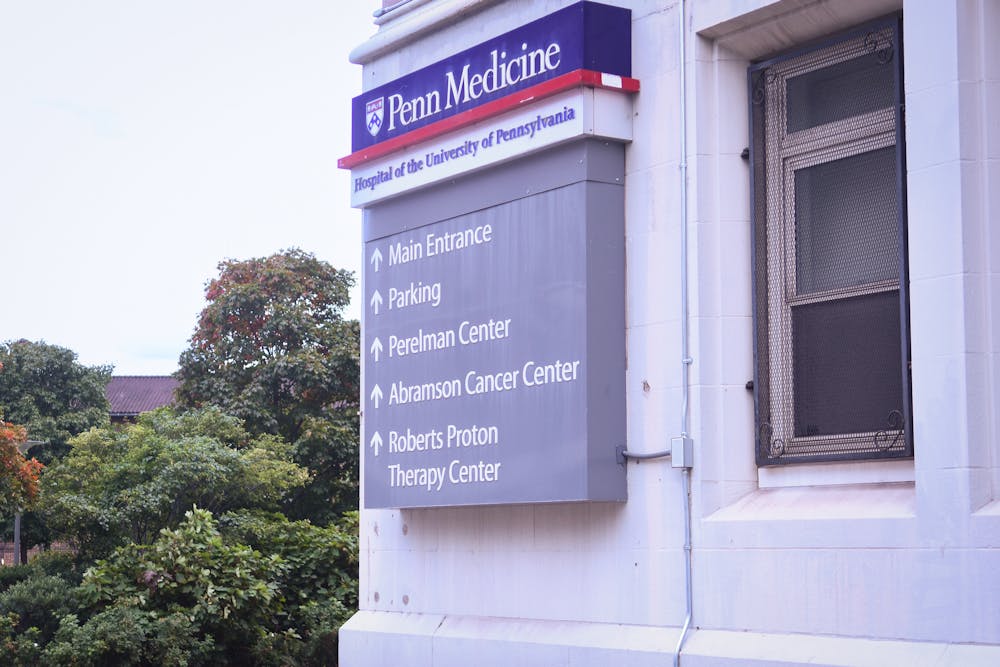
The Trump administration recently restricted NIH funding, external communication, and activity, sparking confusion regarding the state of medical research and operations — including at Penn.
Health and research systems like Penn Medicine and the Children’s Hospital of Philadelphia were among those affected by President Donald Trump’s funding cuts — which were among the dozens of executive orders signed by the 1968 Wharton graduate in the first two weeks of his second term. The federal changes also included the termination of funding for diversity, equity, and inclusion programs. The pauses went into effect on Jan. 22 and were slotted to lift on Feb. 1.
Funding for Penn Medicine from the National Institutes of Health has remained in limbo after the Trump administration moved to freeze communications from United States health agencies — including the NIH. This freeze included cancellations of meetings for NIH employees, a suspension of hiring, and a pause on reviewing grant proposals, causing confusion and concern in the scientific community.
NIH staff were restricted from meeting with patients, recruiting patients for trials, and hiring for staff vacancies. An “immediate and indefinite” suspension on travel was implemented, with the exception of employees traveling home.
The Daily Pennsylvanian previously reported that the executive actions generated “anxiety” due to the severity and lack of precedent for these changes, according to a Jan. 23 email from Interim Executive Vice President of the University of Pennsylvania Health System and Perelman School of Medicine Dean Jonathan Epstein.
“Please know that we are working with our academic and government relations colleagues to understand and respond to the potential impact of these events,” Epstein wrote.
Perelman School of Medicine Cancer Biology Professor Emeritus Jim Alwine, who also serves as the associate director for core facilities at Penn Medicine’s Abramson Cancer Center, described the freeze as “vengeance” from Trump.
“I think Trump … saw the whole pandemic as a personal affront to him, and I think he’s out to hurt science,” Alwine told Axios.
While operational pauses during presidential administration transition periods are not atypical, the level of severity and disruption at the beginning of this term has been characterized as unprecedented, with some expressing concerns over the long-term implications on scientific progress.
The publication date for a new journal article stemming from a Penn symposium was delayed as a result of the executive orders, according to the The Philadelphia Inquirer. It will allegedly undergo review from Trump’s administration to “ensure it aligns with HHS priorities moving forward,” despite being scheduled for publication in May and receiving all necessary clearance approvals.
The article was written by staff members in the U.S. Department of Health and Human Services, and the editing process involved Penn professors. It was based on a presentation about scientific integrity in federally funded research — titled “Advancing Trust in Science: Institutional Obligations to Promote Research Integrity” — given by HHS Director for the Office of Research Integrity Sheila Garrity at Penn in 2022.
On Jan. 27, the NIH clarified the meeting and travel restrictions announced the previous week, implying that meetings and grant reviews may continue. In the update, Matthew Memoli — the newly appointed acting NIH director — announced that existing clinical trials would continue, and patients may still travel to clinical sites. However, new trials were still prohibited from starting.
The purchase of lab supplies relating to healthcare, safety, biosafety, and security were also permitted to continue. The pause of mass communications and public appearances would be short-lived and would not apply to emergency or critical health situations, according to an email from Memoli.
The recent federal changes from the beginning of Trump’s new term also included the termination of federal funding for DEI programs, which — although separate from NIH-related funding freezes — impacted NIH activity and scientific and medical research.
The executive order aimed to rid all the federal government’s “illegal and immoral discrimination programs, going by the name ‘diversity, equity, and inclusion’” implemented under the Biden administration.
Graduate and postdoctoral students and researchers on NIH-funded grants face changes to their programs. A Penn postdoctoral student in the biomedical sciences spoke with the DP about the order and requested anonymity due to concern over backlash and protection of their position in the program.
The student said that their postdoctoral education and the transitional period into a new lab after their postdoctoral training is funded by a DEI-focused grant from the NIH. If the anti-DEI executive order remains in place, the student noted, their program and similar programs across the country will be deprived of NIH funding and have no other organization funding their work.
The student also spoke on misconceptions about what DEI grant programs actually mean and provide, especially in STEM fields.
“People think that DEI candidates are unqualified, but it’s really just diversity among qualified candidates,” the student said.
These grants focus on many types of students, including those who are “low-income, first-gen, [have a] disability, ethnic minorities, [and] people who are historically underrepresented,” according to the student.
In DEI grant programs, the NIH not only provides direct research funding but also helps remove barriers for disadvantaged students who may have less experience with processes in higher education, the student said. They explained that these diversity programs help talented students at every schooling level and prepare them for science careers, teaching students to apply for a Ph.D. and connecting them with lab opportunities.
The student said they have received a few “vague” emails from Penn administrators that told students they may continue to submit grant proposals to the NIH. However, they have not heard from their grant manager about the funding and future of their particular DEI grant program.
According to the student, this lack of communication is a result of a recent HHS memo ordering the stop of “communications” with the public, including via speaking events, social media, and press releases.
“Everybody has lost the plot. We are all trying to save lives and pursue human knowledge and it seems like the people in charge don't want that,” they said.
The Daily Pennsylvanian is an independent, student-run newspaper. Please consider making a donation to support the coverage that shapes the University. Your generosity ensures a future of strong journalism at Penn.
Donate












